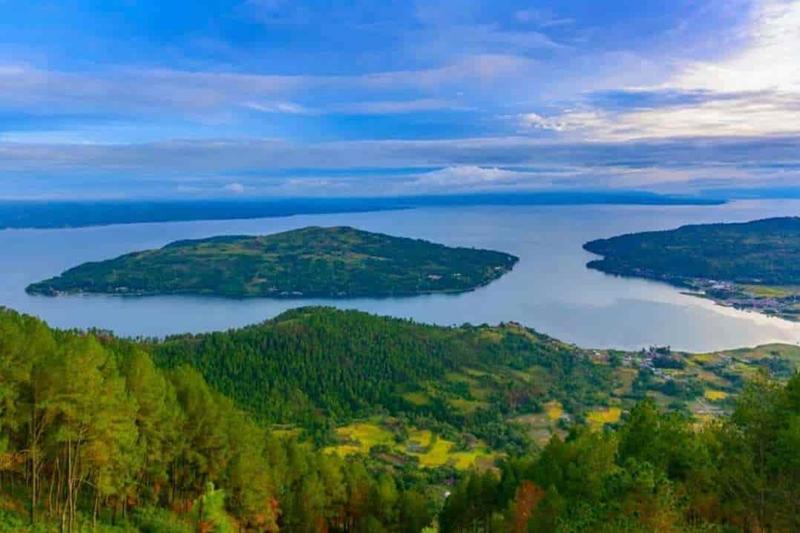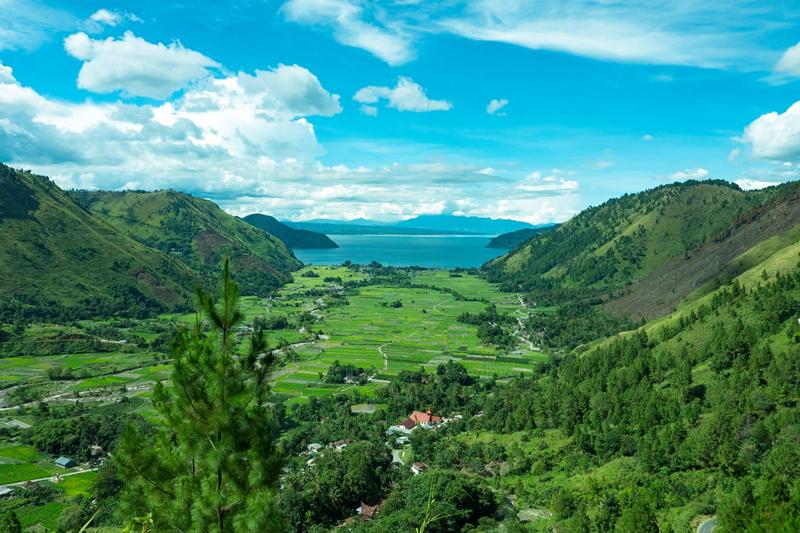Tucked away in the southern curve of Lake Toba lies a breathtaking landscape that many travelers have yet to discover: Bakkara Valley in Baktiraja District, Humbang Hasundutan Regency, North Sumatra. While tourists often flock to Parapat or Samosir Island, Bakkara Valley remains a relatively untouched paradise—rich in history, culture, and natural beauty.
📍 Where Exactly Is Bakkara Valley?
Bakkara is located on the western shore of Lake Toba, where the land dips into a serene, fertile valley flanked by majestic hills. From Medan, it takes around 7-9 hours by car, depending on traffic and road conditions. Though it’s a bit of a journey, the scenic route past pine forests, hills, and waterfalls makes it well worth the effort.
The valley itself is bisected by the Aek Silang and Aek Simangira rivers, which flow directly into Lake Toba, creating lush rice paddies and an idyllic farming community that thrives in harmony with the land.
🏞️ Nature at Its Purest
Bakkara is incredibly fertile. Thanks to the volcanic soil of the Lake Toba caldera, the valley bursts with agricultural life—coffee, onions, tomatoes, and a variety of tropical fruits flourish here. One of the main draws is the fresh spring waterthat flows straight from the surrounding hills, often described by locals as “air dari surga” (water from heaven). No wonder, because the taste is pure and refreshing, sourced directly from the mountains.
From a visual standpoint, Bakkara offers soul-healing views. Imagine the emerald valley floor, terraced rice paddies, and a wide-open view of the lake stretching into the horizon. It’s a landscape that hasn’t been over-commercialized—yet.
🏛️ Historical and Cultural Importance
Bakkara is more than just a pretty face—it’s deeply rooted in Batak Toba history. Most notably, it’s the birthplace of Raja Sisingamangaraja XII, the last Batak king and a revered national hero who led resistance against Dutch colonization in the late 19th century.
You can still visit the Ruma Bolon (traditional Batak house) of the Sisingamangaraja dynasty and the tomb of Raja Sisingamangaraja XII, which has been preserved and honored as a cultural heritage site. Local guides can provide deep insight into Batak spiritual beliefs, royal lineage, and heroic legends. It’s like stepping into a chapter of a living epic.
🌄 What To Do in Bakkara Valley?
While Bakkara isn’t yet packed with resorts or mainstream tourism infrastructure, it offers raw, immersive experiences:
-
Visit Istana Sisingamangaraja – Explore the preserved wooden palace and learn about Batak royalty and colonial resistance.
-
Trek to Bukit Simamora – For panoramic views of Bakkara Valley and Lake Toba.
-
Swim in Aek Sipangolu – A sacred spring whose name means “water of life.” Locals believe the water has healing properties.
-
Fishing and boating on Lake Toba – Enjoy the peaceful side of the lake, far from the crowds of Parapat or Balige.
-
Join traditional ceremonies – If you’re lucky to visit during Pesta Adat, you’ll see the vibrant culture in full display: ulos-wrapped elders, gondang sabangunan music, and ritual dances.
💡 Why Bakkara Valley Deserves More Attention
While places like Samosir Island and Balige have gained tourist fame, Bakkara is still a “raw diamond”—offering everything from heritage tourism to natural wellness. It has the potential to become a slow travel destination, perfect for those wanting to disconnect from the digital buzz and reconnect with nature and tradition.
For eco-tourism, agro-tourism, and cultural preservation, Bakkara could be developed in a way that empowers local communities while maintaining its authenticity. Already, there are small homestays and local food stalls offering Batak specialties like arsik (goldfish stew) and naniura (Batak-style sashimi). There’s opportunity here—not just for tourism developers, but also for creatives and storytellers who want to highlight untold Indonesian landscapes.
🛶 Final Thoughts: A Valley of Quiet Legends
Bakkara Valley is not a place you stumble upon—it’s a place you seek. For travelers drawn to stories, history, and quiet natural beauty, Bakkara isn’t just a destination—it’s a reminder that Indonesia’s greatest treasures often lie off the beaten path.
So next time you’re exploring the Lake Toba region, skip the crowded spots for a day or two, and give Bakkara a chance. You might come home with more than just photos—you might carry a piece of Batak spirit with you.


